Thanks to Faye (Desmond) Keeffe, this is Bob Desmond’s story as he told it titled “Looking Back Down the Dusty Track”, written in April 1999.
Robert (Bob) Desmond’s Diary
Well here it is – as much of my life a I can remember, exciting and not so exciting, good and not so good, down on paper.
I was born on the 26th of May 1918, at the Maternity hospital in Geraldton. The eldest son of Robert Phillip and Josephine Mary Desmond. I had four brothers, Gerald (Digger), Peter, Augustine (Gus) and Paul, no sisters.
My first home was Binnu, where my father was share farming. From there we went to a farm my father brought from his brother James, it was called Mt Hill Springs, a few miles out of Walkaway.
1923
When I was just 5 years old I fell into a shallow well full of water. I was dipping a little bucket in to help my mother get water out for the garden. I remembered being pulled out of the well by the seat of my pants. A few moths later I was with my father, he was putting up a new windmill. I was running around playing and fell on the fans, cutting my hand very badly. I flaked out and Dad carried me home where mum stopped it from bleeding and tied it up. It would have been too far to travel to Geraldton by horse
and cart to get it stitched, I am still wearing the scar today.
I can remember waiting and listening at night for my father to come home. He was contract carting with his horse team. My mother must have had a lonely time out many miles in the bush, all day and half the night.
1924
We shifted into Walkaway to live so I could go to school. I went to the State school for about two years then over to the Greenough Convent. I boarded here for about a year until my cousin Alma Rutherford started school then we drove over in a horse and cart every day as day pupils.

The Grennough Convent as it is today in the Historical Greenough Hamlet

Greenough Convent in Bob’s day
1925
I had to help Mum milk the cows, as Dad was away share farming. My first chore each morning was to go over to the shed and get feed for the cows and horse. This one morning when I opened the door, there was a wool bale just inside the door, freshly put there over night. So I had a look inside and saw a dead man’s body in the bale. What a shock!! He had been shot at a place called Ellendale by a chap called Tom Shaw. My uncles had brought the poor chaps body in, through the night. Shaw was working with my uncles, and this Englishmen for Logues. As they were getting ready to get on their horses and go back home, Shaw shot the Englishman. The police and my uncle Peter went out the next day and Shaw was caught, and jailed at Geraldton. I don’t remember remember what happened after that, but I do remember the cows didn’t get any chaff that morning.
1927
The depression was starting to be felt, work was hard to get and Dad went to work on the main roads. He worked two weeks on and one week off (without pay). I used to set a few traps for rabbits and sell the skins for pocket money. When the skins dried they were very light, it took about 8 hours and 10 good skins to make a Ib. (453 gms) I got 6 pence a pound (5 cents).
1928
I saved up enough cash to buy a second hand bike for £1-10-0 ($3.00). It was very handy going down to check on my traps in the mornings, it saved me a lot of time. I was in a hell of a hurry one morning when my dog ran across in front of me and I came a lovely buster, gravel rash and very little skin left at all. I was very sore for a weeks, never hurt the damn dog.
In the depression years we had some pretty tough times, my Dad strained his heart lifting a scoop when he was doing some road work with his teams. The doctor told him he couldn’t do anymore hard work. He had to sell all his horses and plant and the doctor arranged that he receive a pension, which was a very small amount in those days. He used to get a very bad pains, swelling in the chest, and eventually pass out. Sometimes he was unconscious for a few minutes, occasionally it seemed much longer before he came to. My mum has some very anxious and worrying times.
Mum had to go out to work, she did washing and ironing or any domestic chores for big families, anything helped to be able to keep the home going. She earned £1-0-0 ($2.00) for a long hard days, washing and ironing. I remember some Friday nights, if we had been good kids, mum would give us 6d (5 cents) to go to the little store and buy some lollies. We shared them between the three of us, Digger, Peter and myself.
I can also remember our parents used to take us over to the beach called the flat rocks for a two week holiday every year. We looked forward to this, we would go swimming and fishing. We would be a day getting the camp ready, we would build a shack, it had bags sewn together for the sides and cut bush for the roof, we thought it was great. We had to take several spring cartloads of water in drums. We would pick up some big pieces of collie coal that sometimes fell off the steam trains. A large lump would last for a day and night for cooking, which was done mainly in camp ovens. We caught plenty of crayfish on these trips.
Mum used to make bread in the oven or a quick damper or cook fish. We used to trap rabbits and gather shellfish for cray bait. We cooked our crayfish in a kerosene bucket. These buckets were made out of 4 gallon kerosene tins, which made a good bucket. I remember my mothers baking dish was one of these tins cut down. She always used it when she had roast turkey on Christmas Day. You could cook about thirty crayfish at a time in the bucket, and it took about 20 minutes in boiling water. Dad used to do most of the fishing. We also had a couple of uncles who lived close that caught quite a lot of fish. The crabs used to come up to the camp at night, and they would often give you a fright, they would crawl over your bed and make a scratching noise. The Rutherfords used to come over sometimes, while we were at the beach. Bob Rutherford caught a big Jew fish there one year. It was very heavy, probably weighed about 30 lbs (13.5 kgs), and certainly would have taken some landing over the rocks. Lots of people used to come over to the beach for the night, in the cool, and go home early next morning. There was always somebody coming or going, you were never lonely camped there. We used to be able to paddock our horse just over the hill about a mile away. There was plenty of water and feed, and it belonged to Mr Bill Criddle, Dad knew him very well. My brother Digger and I used to walk over the hill every few days to check that the horse hadn’t got away and walked back to Walkaway. We also had to keep a check on the water for the horse.
1930
We shifted to Bradley’s to live where I went to school for two years. I left school at 14 years of age and went working with Dad for a while. We did whatever work we could get, like fencing or working of any kind in the shearing sheds.
1932
I started working for Tom Levett, for a big pay of 7/6 (75 cents) per week. I worked ten hours a day starting all times in the mornings. They used to have us up so early, one bloke said about his cereal “Is this oats wild, that we have to sneak up on it in the dark?”
Tom Levett used to share farm at two places at Logue’s one block over the river and the other this side. We had to do a lot of carting across the river. One old chap, Peter Snotgrass had his dingo traps up the river and he used to take me on the horses to look at the traps. I used to enjoy that, it was very interesting. You had to keep well away from where they were set, as the dingoes could smell if humans had been around.
One night we were taking a load of wheat into the siding and while crossing the river one of the young horses that Tom Levett was breaking in got a fright from the river running over the stones. He choked down kicking and really playing up. So the boss said here, take this pocket knife, hop down and try to cut the haimes strap. I got it undone after a battle, I was as wet as a shag and shivering with fright. I was very lucky I didn’t get trampled on, or kicked in the dark.
We finished at that place and shifted over to the other crop and after a week there Tom Levett went into his own place to harvest his oats. He left me to feed and water the horses. We also had a load of hay by the horse yard. I used to sleep up on the load, as there was a big snake track in the shed. One night the dingoes were barking and howling, as we weren’t far from their watering spot on the river. In the night the horses broke out and pulled the side out of the load of hay. Then both the hay and I hit the ground as it slid down, I finished up under the lot with hay all over me. I didn’t know whether the dingoes or the horses had me. Without a light, it took me a long time to get them all back in the yard. I had to shift some of the hay away from the fence or yard. About a week after, we shifted back home to Walkway.
1933
It was mostly casual and seasonal work, a few months at a time. I got a job at Hugh Hamersley’s for the season cropping, driving a team of horses, had a few young ones a bit hard to handle. While feeding them one night, one silly bugger bit my shoulder. He grabbed me and lifted me clean off the ground. They took me over to the house, and a chap called Don Broad cleaned the wound up and put some Flavene on it. I had a crook shoulder for a while. When that job finished, I went cutting wood with Dad and getting a few roos in between, which helped a lot.
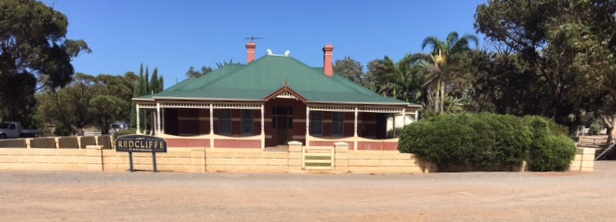
The Historic (Jones Built) Hammersley House at Walkaway as it is today.
1934
Robert’s brought a farm at Georgina and I got work there. They came from Waddi Forest, at Coorow. Mr Robert’s was married to a Ruddick girl. They were slave drivers, buggers to work for, only paying one pound a week and you had to supply your own tucker; I also had to feed the cattle on Sundays so it was 7 days a week. I couldn’t play any tennis or cricket, so that job wasn’t any good and I smartly left there.
I went to a few farms for the shearing, then my uncle Peter gave me a shed at Edah (later owned by Colin Broad) across the road from Wagga and just out of Yalgoo, doing work as a rouseabout. He had the contract for that shed.
1935
The sheep were very poor on the station that year. The cook couldn’t even bake meat because there wasn’t anything on a leg, so it was stew and curries or mince all the time. The hills used to be just white with goats, they were getting all the sheep feed. A shearer and I went out shooting one Sunday. The goats were all colours and the roos were thick. I would have liked to have been there kangaroo hunting for a living. It was fairly quiet place.
After finishing there, I got a job at Eves’s at Walkaway. He sent me to Elena to bring back a mob of cattle. Norm Criddle a good mate of mine came with me, he was later killed while at war. We had to muster the cattle in one day and drive them down at night, as there weren’t any yards to hold them in so it was pretty hard going. On the way down we had trouble as some cattle were trying to go back to their calves, so we had a busy night. My mate lost his good cowboy hat in thick bush as he went in after the cattle, we searched everywhere for it but we didn’t find it. After we came down towards the coast we could see some lights a long way away. As we got closer, it looked like a big ship out to sea. It didn’t seem to be moving, it seemed to stay in the one place. The next day we found out it was actually a ship and it was stranded on a reef out from the flat rocks. “Calligaros” bought it and were able to salvage a lot of gear off it before it broke in half. The crew were all saved, but I think the captain would have been fired for being that much off course. If he had gone a little further off course I think he would have run into the Walkaway pub.
After a few days I was sent to Northern Gully to fix a mill that had stopped pumping. I went down the well which had an old rusty ladder that didn’t look too safe. Phil Desmond was working with me, and he was at the top of the well sending anything that I wanted down, in a big bucket. There was a bit of bumping going on at the top and the next thing, they yelled out “LOOK OUT!” and down came a big jam post. The top had been covered over with posts and as it fell it hit the old ladder breaking it just above my head. Down the well I went, with a very sore shoulder. They got me out with a rope and bucket and I was able to help by coming up the pipe. My arm and shoulder were very sore for a few days. I was lucky the old ladder took most of the fall.
Tenindewa Store & Office When I was about 17 years old I got a job working for Harry Eves, Post on a farm south west of Mullewa, towards Walkaway. I was working with his nephew George Eves, who later owned this farm. George would take me into Tenindewa each week to play football, as they needed footballers for the Tenindewa Club. I met Robbie and Wally Weir on those trips. I remember kicking two goals during a game which left me feeling pretty good. In later years, I played for Federals Football Club in Mullewa .Rob and Mel Weir History
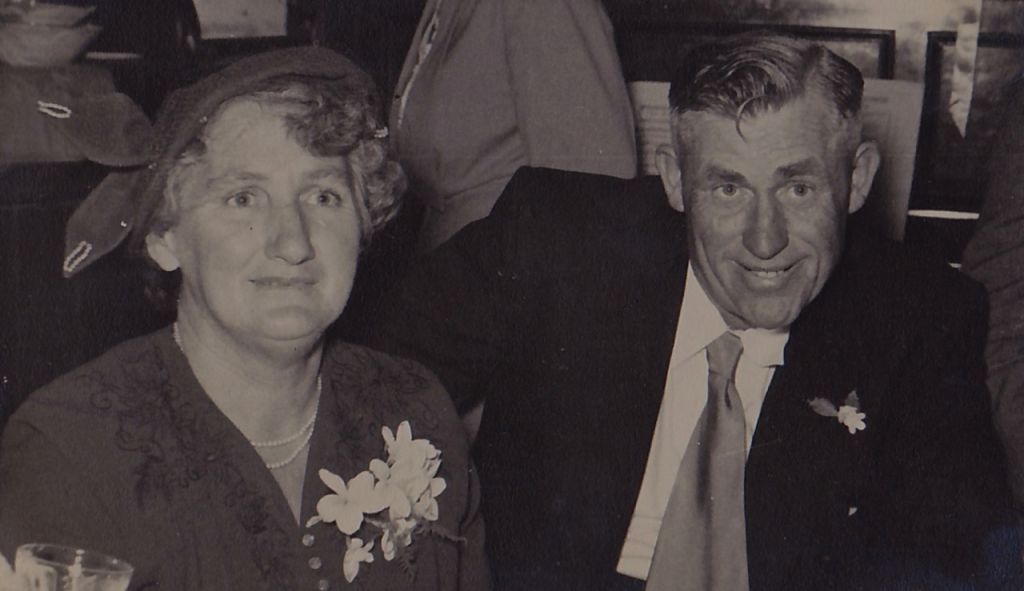
George and Grace Eves
1936
I went down with Bob McAullife fencing and clearing at a place called Mininooka. We were camped out in the bush, the cook house was a tent and we had another tent to sleep in. It was a pretty good set up. We got our stores and meat from Readheads, the only problem was that to get the meat I had to go in on my bike and kill the sheep and go back again the next morning to cut it up (a few miles each way).
A few weeks after they started shearing Bob and I went to work in the shed where he worked there year. It was a big shed, about 10,000 to shear. After about a week the wool chaps come up from Perth; Jack Prevo was one of the big boss’s from the Woolstore. He was a top wool man and they stayed all day looking at the wool. I had been given the job as piece picker and they came up and asked a lot of questions about where I had worked with wool before. Bob came to tell me they wanted me to go to Fremantle Stores. At smoko time Readhead brought them over to where I was and asked me if I would be interested in a good job down at the stores. I had to let them know if I would take it. But at that time I had started to become very friendly with a lass called Rita. So there you are. I was sticking to her then and I’m still sticking to her now. I must have made the right decision.
Tom Readhead’s was a good place to work and the meals were the best of all the places I worked at. There would be three choices for each meal including breakfast. Mrs Readhead and her daughters were wonderful cooks. I got a job at their station at Mingenew when they started shearing. After that finished, Bob McAuliffe and I went fencing for Charlie Readhead at Melera, (also in the Mingenew area) so we camped in tents again, out about six miles. Every Sunday I used to ride into the homestead for a few stores and a letter from my sweetie. I took a contract clearing for £1-0-0 ($2.00) an acre and I cut the wood out for 7/6 (75 cents) a tonne and sold it to the Brick Kiln at Bootenal. There were a hundred acres all told, but I only made tucker. I worked for Major Logue for the harvest and in those days, you had to grade your wheat with the old wino machine. It was turned by hand, very slow going, you had to take the radish out before you could sell it. A few years after that they put engines on them and it was a lot easier and faster. A few farmers in those days had an old Chev Ford truck that could carry about 25 bags into the siding.
It was still depression days and things were still pretty tough. So I’d go kangaroo hunting, taking my kangaroo dog and a young horse I was breaking in for Tom Levett for £5-0-0 ($10.00). One time I was about 12 miles out when the dog bailed up a big boomer. The dog had a long run to catch him so he laid down exhausted under a tree and left it to me. I tied my horse to a blackboy and the roo came at the horse. I grabbed the roo by the tail to stop him and he turned on “Bobby Boy” so the game was on. I got out my pocket knife and opened it up and by this time he had me down and looked like winning. Then I managed to cut one of his hamstrings and he got savage, tearing my shirt off and cutting my arm. He was still kicking me with his good leg. The dog never even looked, he was too exhausted to help. Finally, I got the other hamstring cut so the battle was over. My horse was very frightened and stirred up by all this going on. I finished up with 3 skins that day and a very tired dog. I just couldn’t let the roo get away as it was a days wages. Sometimes I would have to carry my dog home on the horse, he would be so worn out.
On the weekends Oscar Criddle and I used to take the kangaroo tails to a chap at the hotel who he paid us 2/- (20 cents) each for them. It was 1936 that I started doing a bit of shearing in some small shed. Then I got a stand at “The Grange” at Irwin where we knew the manager there, Rod Piper, who was a distant relation of my mother. He married a “Cary”. I think it is strange because when I got the farm at Indarra, through the war service, he was our field supervisor and a very nice chap. The sheep on “The Grange” were very big wethers to start with, so that made it a bit tough on my back. A shed hand, Ray Baguley, and myself had our meals at Rod Piper’s house. Rod used to give my back a rub every night which was a big help. The other shearers and shed hands had their meals at the station home.
I used to ride my bike home, to Walkway on Saturday afternoon and back on Sunday. Sometimes I got a lift on the road workers trucks, which was good as it was about 40 miles.
After that shed cut out, I went to Mullewa shearing for Mick Loughnan at Urawa, were we stayed for nearly a month. When we finished I caught a train home and met Rita at Narngulu. Peter, my brother and Rita were waiting for me with a horse and cart and I was so pleased to see them, as I had thought I might have to walk and carry all my gear back to Walkaway.
1937
There used to be some casual work around the loco, at Walkaway. Coaling up the steam engines, a lot of shift work. There were trucks of coal to be unloaded up into the stage. The pay wasn’t very good, but it was a job, we got 2 shillings (20 cents) a tonne. It was very hard on your back. Steel bottom trucks were good to unload but boards were terrible as there used to be nails sticking up, giving your wrists hell, jarring all the time.
1938
I was getting seasonal work at Jones’s Bros farms at Belay. After I had been there a few times, they put me on permanently. I stayed there until it was nearly time to go into the army in 1942.
While working at the Jones Bros I used to train their race horse. They had a beautiful looking filly named Black Princess. She was from a half Arab race mare and an Arab stallion and was very fast and won quite a few races at the Walkaway races, in pretty smart company. I had to rise very early to train the horse in the dark before work as it was hay carting time when the races were run, and hay time was a very busy time.
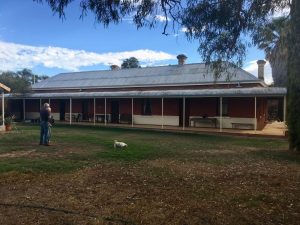
Belay Farm Homestead today.
They used to cut about a 100 tonnes of hay, as they supplied Boogardie station, (also owned by the Jones’s) plus their own horse teams. They also sold chaff which was all steam cut with a steam engine. It used to be fed up through the steam elevator to the cutter. When hay carting, and making haystacks they had two builders and two pitches making two big hay stacks every year. It would be all gone by the next season. They also ran a lot of cattle and used to bring them down from the station to two (fatten) them up for market. Each week they killed 2 sheep, and I had to cut the meat up the next morning and deliver it to the cook. I had to have the fresh chops in the kitchen early enough for the cook to have them ready for 7am breakfast, another very early start. My pay here was £2-0-0 ($4.00) a week.
1942
On the 30th of January I got married. While waiting to go to the church that day I remember the Iceworks blew up making a big bang. There were 44 gallon drums flying sky high. After we were married in the lovely little broom room, of St Francis Xavier Catholic Cathedral, Geraldton (in those days mixed marriages were not allowed to be held in front of the main altar) we went out to Rita’s people place (the Patience family) and had a very nice reception. Just the two families, as it was war everywhere at that time. We went back to Geraldton to live until the 3rd March 1942, the call up time.
I worked on the CBH wheat silos and on the wharf, digging air raid shelters for about a month. We then went out to Mum’s. I caught the train from Walkaway to Claremont Army camp and Rita went home to her people, one of the saddest days in our life. Later Rita came down to Midland and stayed at Aunty Jean Rutherford’s where at least I could visit her occasionally.
She went back home to her mothers before Allan was born on the 28th November 1942.
We arrived at Claremont Army camp to be fitted out with our army gear. We were there about a week, then sent to a Northam camp, the coldest spot in the West. The huts were about 2ft high from the ground. Our mattress was just a bag with a few pieces of straw in it. The wide cracks where the floorboards joined made it even colder. A few chaps got sick while in Northam. I finished up in the army hospital called the 188, at Northam.
Rita and Aunty Jean Rutherford came up on the visitors train to see me, the train ran up in the morning and back at night of a Sunday. I think I was over it pretty well by then, I remember they brought a picnic lunch. There was a Yank in the bed next to me who had been shot down up the top end by the Japanese. They would give you the world and they had everything you could wish for. They would almost need their own plane to carry all their gear around. They were looked after much better than we were. Rita came up and stopped at Northam in a boarding house for a few weeks but it was a terrible place then, overrun by soldiers. You had a job to buy a nice meal, it was just over populated.
I used to shoot through at night every chance I got. I was caught a few times but it was worth it. You needed eyes in the back of your head all the time, as if you got caught your pay would stop and you had to do a few days of heavy pack drill.
One time a few of us cleared out in the afternoon, from our camp about 20 miles out of Northam. A truck loaded with a big high load of chaff came along. He stopped and put us on top where we couldn’t be seen and let us off just out of town in case the M.P’s (Military Police) got us. We then found out that a train left at midnight to go out our camp way, so we had to be up in the railway yard before midnight to find the right train. We finally got on and hid pretty low til it pulled out. We knew when to jump off, it had to be going up a hill and around a bend, (this part of the railway line was built up about 8ft high). At night you had to judge when you thought it was going slow enough around the bend. You had to take a long jump to clear the tracks and roll down the bank. The train picked up speed when it straightened up, if you left it too late then the harder you fell, but it didn’t seem to worry us then. I wouldn’t like to try a jump today, there could be a few sore patches. Then you had to sneak into camp because there would be guards on duty.
When I first went into the army I was put into the signallers, cable laying for morse code, but I didn’t like it. So I put in for a truck drivers job and within a few weeks I was allocated the rations and leave personnel truck. That was a good job picking up stores of all kinds and carting soldiers into the railway to go on leave. I didn’t have to do much marching.
1943
I had been sick (with diarrhoea) when camped at Jurien Bay and was in the Army Hospital for about a week. When I got out I was sent to the Moora rest home, a big home that belonged to the Le Steere family, to recuperate for a few weeks and that was real good.
Then we shifted back to Swan View again, back to the truck driving. Before we arrived at this camp the Eastern states mob had camped there and done a lot of damage to the adjoining grape vines. I was away with the truck getting people that had been off on leave one night and some of the boys thought they would get a few grapes to eat. They asked a land army girl tending the vines could they have some grapes and she just walked away. The next thing they knew there was a shot fired over their heads. So they took off back to camp, they were still scared when I arrived back. I was pleased I was on the leave truck that night, there was never anymore said about it.
On March the 20th some good news came through, there was a big shortage of shearers for the farmers everywhere in the North West. Christopher Thomas O’Brien, Tom had applied to get me out, as he had been talking to Dad. Dad had told him I would like to get out for shearing. They got onto their member for parliament, that was Vic Johnson, and after a few weeks I was called up to see Major Humphries with about 10 others. About a week later we were out. Some chaps had to go up north, where-ever they were needed. It was April 1st, the day we walked out of camp to get the train, and I remember one of the boys saying “Don’t look back, it is April Fools Day” they might call us back. I went straight to Tom O’Brien’s, and he lent me his shearing plant which I used for about 3 years. Then I was able to buy my own plant and continued on shearing until going onto the farm. I was earning one pound and six shillings ($2.60) per sheep.
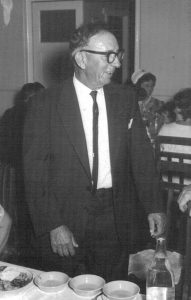
The gregarious Tom O’Brien
1944
Annette Joy, our first daughter was born 7th June 1944.
I went to Mullewa shearing first, I had no vehicle, only a push bike and at that time the roads were only sand and gravel, very rough going. I remember riding out to Brenkley’s,about 20 miles, in the dark on Monday mornings. I arrived in time for breakfast. I nearly got bowled over by kangaroos and ducks. The ducks were nesting on the side of the road and they got a ‘start’ as I peddled past. Sometimes I would stop for a bit of a rest on Tom Forster’s verandah. Occasionally you could catch an early goods train, but you had to make sure you had the right train. One time Eric McCagh and I decided to give it a a go. We climbed into a carriage about 4am on the Monday morning, and fell asleep while we waited. When we woke up the other train had gone and our carriage hadn’t moved an inch. We were lucky enough to get a ride on the School Bus to Tenindewa. We then set out walking to Troy’s at Indarra and fortunately Tom O’Brien came along and gave us a lift, but we had a very late start that day. This wasn’t good enough, so it was back to pedalling the next Monday morning.
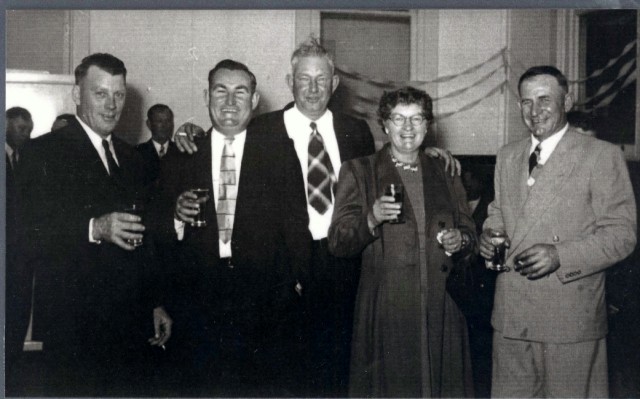
Bob, Keith Bone, Eric and Mrs McKay and Frank Fumic
I could nearly always get a lift into town from the farms, on Saturday afternoon after shearing. It had to be a ute or a truck to get my pushbike home, ready for Monday morning. My old bike was just about worn out from the rough roads and long trips, it was a hard battle sometimes on the bike, especially on rainy days. In my shearing days we struck some very rough camps, dreadful beds and mattresses and no facilities to have a good wash. One place we went to, Archie Olman’s, The Olman’s camp was made of long poles and lined with bags. There were two beds made out of bush rails and bags, and just enough space in the room to move in between the two beds. They weren’t even long enough to lay out straight to sleep. There was sheet of tin for the door, and the only room for any of our gear was under the bed. One night Eric stretched out and the end of his bed fell out, so he had to sleep the rest of the night with his feet on the ground and his head up high. This was one shed we didn’t like much.
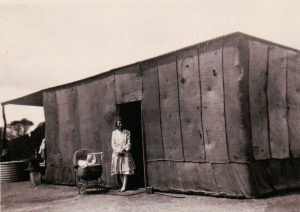
Archie’s Camp
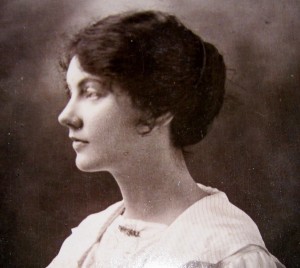
Mrs Eva Dunkin (nee Stafford) was the first teacher at Tenindewa school
The Dunkin Family or Dick’s was a rough shed, but we had very good conditions in the house. Mrs Duncan (nee Stafford) couldn’t do enough to help. She even made our beds and would give us an extra rug if the weather was very cold. At some of the sheds you had to get some wool from the shed and put it in a bag for a mattress, because there wasn’t a mattress on the bed. There certainly were some rough old places, and I couldn’t carry much because I only had a push bike for most of the early days. I finally brought an old ute £50.0.0 ($100.00) which had been a studebaker car, cut down to a ute. It had belonged to Ernie Rumble years earlier and had been run on kerosene and the motor had no power. My bother Digger, who did a lot of shearing with me, used to tell everyone that he pushed it up the hills and jumped on and got a ride down the hill. A salesman up from Perth offered me £75-0-0 ($150.00), so I gladly accepted and loaded it onto the railways. I then brought an old international ute from Wally Smith. This was a much better vehicle and it lasted a long time. We still had it on the farm for quite a few years afterwards.
I remember some of the early happenings in and around Mullewa in the 1945 – 46 years. It was said about that time if you put up a big marquee over the town you could have the best circus in the west. One humorous incident that happened was when a drover named Ned Ridley came to town, with a mob of cattle and his team of camels. He had killed a bullock that afternoon and wanted to put it in the butchers cool room. Being unable to find the butcher he asked his mate the local policeman if he knew here he might find him. So along they went to the local drinking spot and tapped on the door. It was 10pm and the pub should have been closed; the publican said “its the police.” There were about 10 to 12 people in the bar at the time, this included the butcher and the local draper called Jim. Jim thought he would quickly hide away from the police and climbed up the fire place chimney, as far up as he could go. When the policeman came in, he said “Haven’t you lot got a bed to go to?” At that time Jim couldn’t hold on any longer and crashed down to the floor. The cop said “Who’s that?” and Jim replied “Father Christmas”, so they all got told off and the butcher left with the drover and the policeman to put the bullock in the cool room.
Our second daughter, Dolores Faye was born on 4th February 1946.
In 1947 when I was shearing around the Mullewa district, I was still paying off our house at the time. The house was just across from Mullewa hospital and is still there today. I purchased it off Mr Page for £450. At the time, Mr Page owned the power station in Mullewa. He was pretty good to me and offered me a bit of extra work at the power station whenever I had any spare time. I used to go down to the station and pack ice, to be sent up to the sheep stations either by road or train. The money I earned, he would deduct from the amount I still owed on the house. A few years later when we moved out to the farm I sold the house to Al Brand. Around this time I was offered S.B.P (starting price bookmaker) for a chap on a commission basis, running a book on the races each Saturday. It was all a help, a little bit extra to help pay off these payments. Once I moved out to the farm I had any amount of work to do, so I didn’t have enough spare time to continue with these odd jobs.
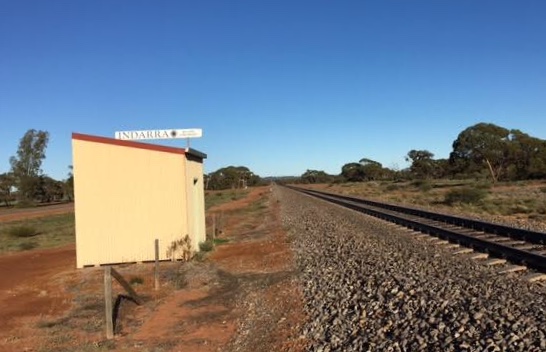
This is the original Indarra Siding Shed.
In 1960 Bob purchased it and “sledded it” as one to Kaluwirri.
The Desmond family donated it to the Lions Club in 1990 and it was put back on site
It was 1948 when I went share farming with Troy’s at Indarra. It was a very poor year for crops and feed. We only
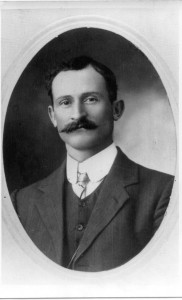
Tom Moore MLC and Indarra farmer
had 591 points or rain, and in 1949 I was allocated the farm “Kaluwirri” at Indarra. Thomas James Moore affectionately known as Tom helped me to get the farm as he knew quite a few people on the War Service Board. Baron-Hay was the chairperson at the time and he had been talking to Tom Moore about the farm. I had to go before the board in Perth and be interviewed. About a week later, I received a letter to say I had been successful. We were very happy about this, Rita and I and our three children, Allan, Joy and Faye were off to start farming.
[Kaluwirri was the name assigned by Troy to the farm. In the book “A Varied and Versatile Life” on the famous pastoralist, Frank Wittenoom, Kaluwirri is the aboriginal name of a Hill Wallaby which just might be the explanation]
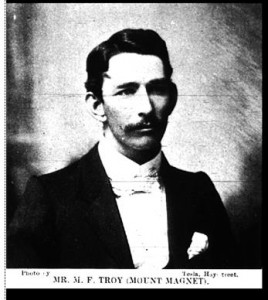
Michael Francis Troy
MLA (Member for Murchison) and Indarra farmer the previous owner of Kuluwirri
1949
To put in a crop, I had to get some machinery so I went to Michael Troy’s clearance sale. Frank Troy as he was widely known was an extremely successful politician and in being the member for Murchison it was most unusual that he lived and farmed at Indarra so many miles west of his electorate. He was of course the person that I had managed to purchase the farm from.
In those days ploughs, combines and tractors were very scarce. You had to put your name in a hat with a lot of other names and be in the draw. I got both the ploughs, so Eric McCagh took one of them, they had quite a lot of repairs done to them. They needed discs and bearings and it cost quite bit to do them up. The main thing though was that I had a plough to start with. Then I had to get something to pull the plough with. You couldn’t get tractors after the war, not even a second hand one. So I went along to the R&I bank in Geraldton and the Manager Bart Lindsay told me I could buy a team of six horses, whippletrees and all the harnesses I needed at Tom Ahearn’s place at Eradu, for thirty five pounds ($70.00). So, that was another stroke of luck my way.
The problem was getting the horses up to the farm, as I had no horse to ride. So a chap named Hoppy Edwards (he only had one leg) said he could ride one of the horses I had bought. We got them in the yard after a battle, then we asked Tom what horse he thought was quickest to ride. He said they had never been ridden so Hoppy picked one out and managed it okay. We got them to the farm after a battle, put them in the yard and fed them for a few days to settle them down. I had brought the haystack at the sale. I had another spot of trouble, I didn’t know which horse was used to working on the rein. I got everything ready to go ploughing and the paddock was very dry and hard. When I got the horses into the plough, they bolted straight back to the shed. I couldn’t steer them, as one had no mouth for a rein horse, all I could do was hang on. The caretaker, Cyril Fogarty, ran out of the shed and waving a wool bale at them. They stopped long enough to get them out and back to their yard.
Arthur Hunter, a salesman from Geraldton, sold me a Fordson tractor and Fletcher Waldeck helped me arrange finance for it. In those days the tractor had no head lights and if I needed to work during the night, I would take a kerosene lantern and hang in front of the tractor. The same year I brought an older header from Vince McGuinness on time payment. To add to the bad year the emus came down from the station country. They were very bad, they came in big mobs and we had to chase them everyday. I caught 78 emus before harvest with a dog and rifle. I stayed on the farm looking after the crops and never went shearing at Bullardoo as there wouldn’t have been any crop left if I had gone. 1949 was a vert light season again for rain and feed was very poor. I brought 840 young sheep for 30/- per head ($3.00) which was very cheap at the time. Crops averaged about 12 bushells. (.8/tonne per hectare)
1950
I brought a sixteen run combine as the older seeder was getting a bit shaky. It was a fair season with 1180 points, wet June and July.
1951
Was a good year for both crops and feed. I brought a new harvester as the older header had had the bomb by this. This was the year Allan had his appendix out.
When we were first out at the farm, we tried to get a car. We need something more reliable, as Rita was expecting Pam at the time. We finished up getting a holden. While we were waiting to be allocated one from Sidney Atkins, the holden dealers, the price went up about £75 ($150.00). About a week later we got the message ours was ready. The I went down to pick it up I saw a chap I was in the army with and asked him how long the cars had been there and he told me about 3 months. There must have been 25-30 cars everywhere. So they must have been hanging on for a rise in price. It made it ever so much more to pay, over four hundred pounds, but I cant remember the exact figure.
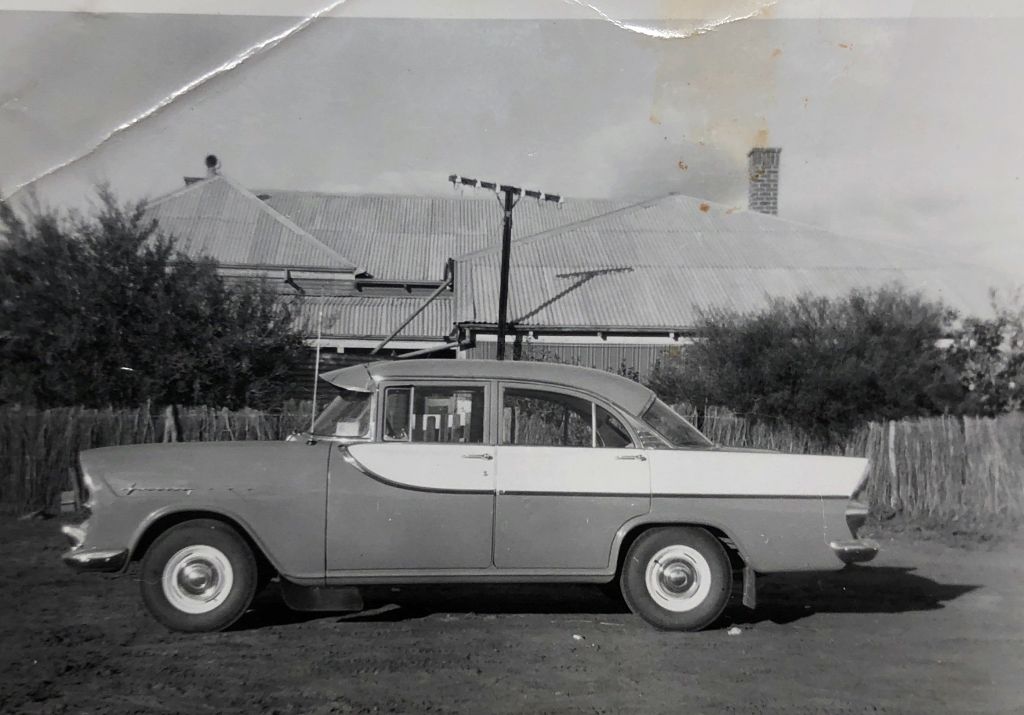
Bob and Rita’s house at Indarra and that FB Holden Car (note the multi-lined telephone pole. This indicates the fact that the Indarra Telephone Exchange operated out of the Telephone Room associated with this house for many years)
There weren’t any lights in the house when we shifted out to the farm. We battled on for about 12 months with what we had, a hurricane and an Aladdin kerosene lamp. Electric wiring was pretty costly, so I thought I’d have a go at doing it myself. I found out a fair bit about it from a chap I knew, Bill Barden. He had a business in Mullewa and was a big help when I needed him. Graeme Fisher put a new Mc Donald 32v lighting plant in; he worked for the McDonald company. This served us very well until the SEC came through (mid 1970’s). That was one of the best things that ever happened to us farmers at the time.
Our third daughter arrived 10th August 1951, Pamela Maree.
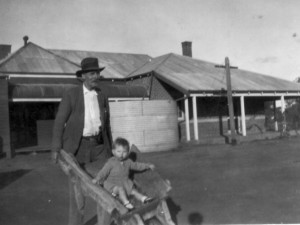
Kaluwirri homestead in about 1920 just after MF Troy had completed it (side view)
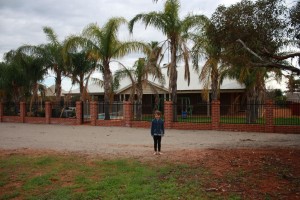
The house from the front view today
1952
Very wet year, 1450 points over 4 inches for May gave a great start to the season. I was still shearing at a few sheds at this stage in the slack times.
Our fourth daughter arrived 10th November 1953, Dianne Mary.
I gave shearing away in 1953 as there was too much work needing to be done on the farm. I had an old chap called Arty Kember working for me who used to do a lot of jobs looking after the sheep and pigs, and he was a big help. He had been on farms all his life and he could do a shift on the tractor if he was needed. I remember one time we had spent the weekend cutting fire wood with the circular saw and the Fordson tractor. Allan woke in the middle of the night and could see a roaring fire where our pile of wood had been. We rushed over to try and push the tractor away from the pile of burning wood and after many tries we realized the handbrake was on. We think Arty had a cigarette in that area before going to bed (Christine Kember and Harry Townsend )
The year of the Meckering earth tremor in 1968, I was over at the soak fixing the windmill. I was standing on some sleepers that were covering the top of the well when they started rocking, shaking and tipped me over, and I fell into the well. I couldn’t work out what had happened, but when I arrived home for lunch, Rita said there had been a bad earth tremor, so that explained the sleepers shaking!! (14th October 1968)
The year Allan was hurt (1964) was a very wet year and we got three tractors and a truck bogged. Paul came over to help and got his tractor in the same mess. We decided to go home and wait for the ground to dry out. It was so wet the water was running out of the ground. I went over into the york gums and found the longest stick I could find. They asked me what I was going to do with the stick and I said “Push it into this mud so we can find the tractors when we come back”. Robert McDonald laughed all the way home about finding the tractor.
We sure had some ups and downs on the farm, but it was a good life, very interesting. We had good years and bad years, but never a dull moment. In the bad years, you just about had to give your cattle and sheep away for very little, then the next year you had to start all over again. Together with Clem Keeffe, we sent away a trainload of cattle. They were paddocked and fed down south, but it hardly paid its way. We had 102 head of ours that we couldn’t even sell. (The Flock Reduction Scheme)
The biggest blow to us was when Allan had his accident, to all the family, we never ever got over it. After he got hurt, it was an uphill battle for a few years. We were very lucky we had a lot of help from some neighbours and people from Devils Creek. Phil Keeffe came down and helped us put in a crop which we were very thankful for. Clem’s father, Glen Keeffe was often down to see if we needed any help.
About 1984 we retired to Geraldton, as I had hurt my back and we had a chance of getting a very good workman in Fred Shultz, so we let them have our house on the farm. Fred was the best man we had, you could go away and leave him and he would be okay.
When Allan fractured his leg in the sharing shed, I was over at the Abrolhos Islands fishing with my brother Peter. When I got home, I went back up to the farm to help Fred. The spear grass was bad in the wheat crop and it had to be graded. The machine to grade the speargrass was very slow, every time the header got a full box, he wasn’t very happy being held up waiting to get his load off. That weekend he made another bin for the old Acco, so he had some more storage. He really had a smile on his face when I arrived back at the farm on Monday morning. He didn’t even go to his tennis that weekend, just kept working.
While we were fishing at the Islands that time, we found a tube made of steel, it was about 6ft long and 2ft wide, and very heavy. It was washed up into the shallow water. It was grey and had a very strange top on it and it looked like a depth charge. It was there for several days and we tried to get it onto Vick’s (Newton) boat, but it was just too heavy. It looked like something off a warship. A few days after we came home we heard that the bomb squad had gone over and blown it up. It was bomb of some kind, so just as well we didn’t play around with it too much. Gary Desmond was with us and he would have liked it as a souvenir. It must have washed off a Navy ship and floated in between the Islands, and into the shallow bay. If a big boat had run into it, it might have blown up or put a hole in whatever it hit. When we used to fish around the Islands, we used to go very close to the old Dutch wrecks. One wreck was about halfway up on the reef and the big boiler was right up on the reef. It must have been pushed up there with high seas. Still there after all those years.
There are lots of very small Islands, the largest is called “Long Island”, and that’s where all the different kinds of sea birds nest. Bishop Thomas used to love going over to Ding Island and they would take him to Long Island, to watch the birds. Long Island is a very long and narrow island. They used to ship the bird manure from there for years, it was used to make fertiliser. The old ramp is still visible were they loaded the rock. Because the water was very shallow, they used a small boat to ferry the rock out into deeper water ship, to take it to the mainland. There are still little heads of manure rock in dumps (approx. 2 tonne). They used this rock through the war years, I don’t know how they ever broke it up, as it was pretty hard. It was rock hard, just like hard super. The North Islands are the same as the South. Manure has been there for hundreds of years. When I started going over to the Islands fishing, we used to go up to the first island, just up from Vic’s camp and we would catch about 20 to 30 groper, enough to fill a couple of wheat bags.
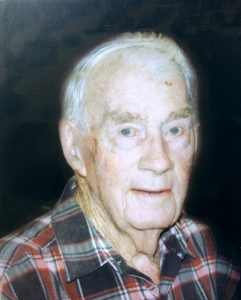
Bob in his retirement years
As the years went by the fish got less and less. You had to move around to find them in the shallow water, inside the reef. When they went out on the big boat, it was different. Fish are very cunning, we used to watch them in the clear shallow water. They would swim up to the baited line, have a look and then swim away, not hungry I suppose. It was very interesting over there, the only trouble was it was very windy, the wind blows all day and night. It is a real treat to have a fine, calm day as it is so open. Lots of days you just couldn’t go out fishing. When it’s windy, it’s a long hard trip back to the mainland, Geraldton. For all that, it is something different and very enjoyable while you’re over there.
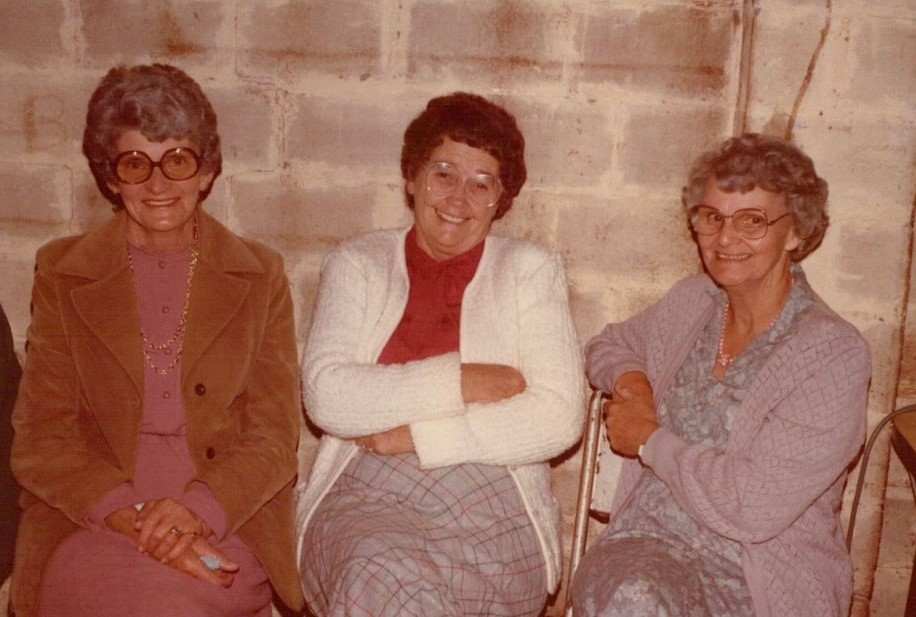
Rita, Mel Weir and Mary Critch (1985)

Dianne Desmond, Geraldine Critch, Josephine Critch, Judy Foster, Pauline Critch, Pam Desmond at Tenindewa 1962
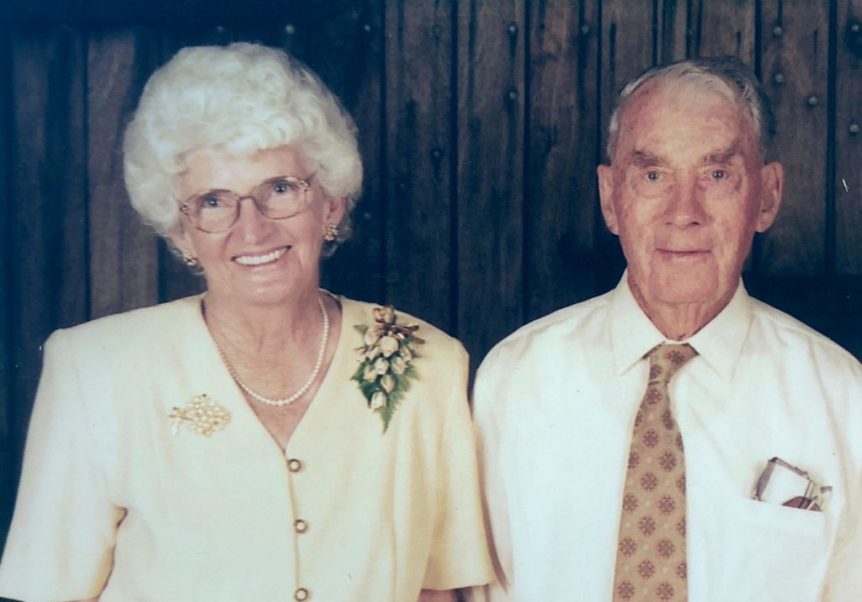

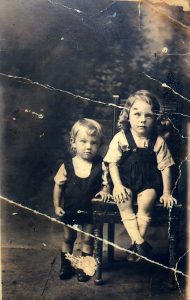
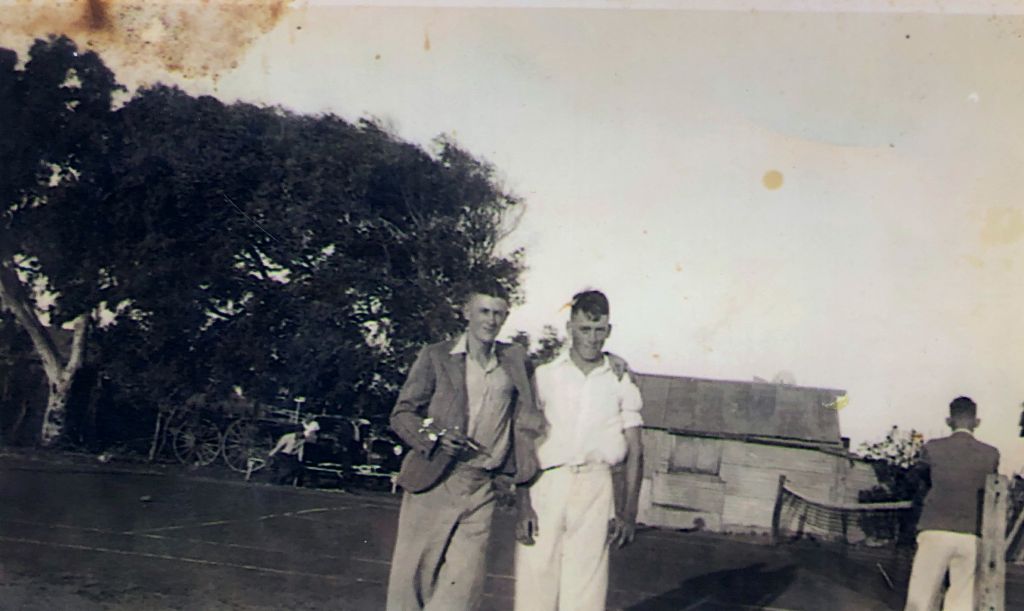
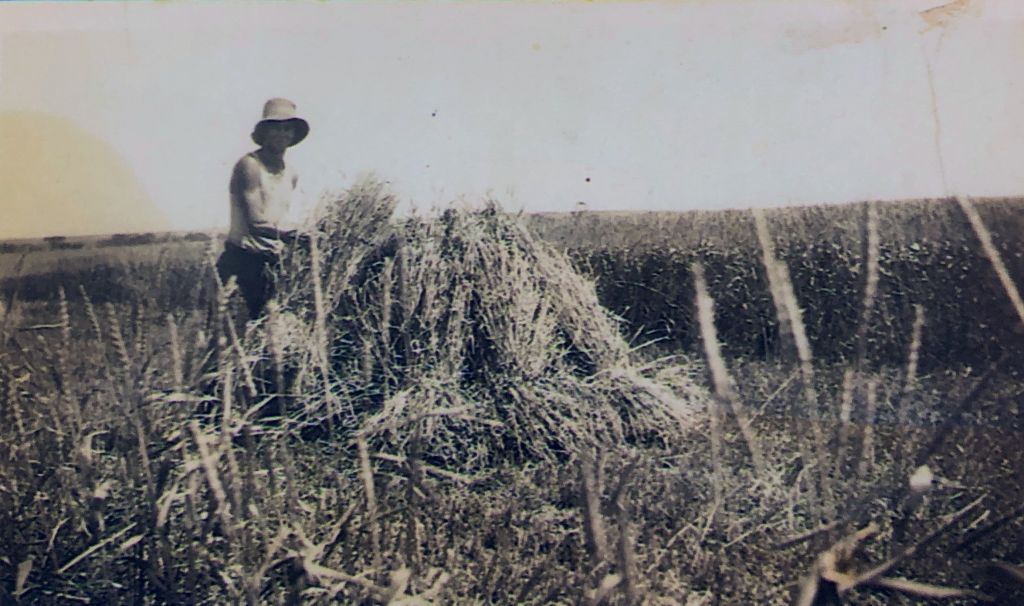
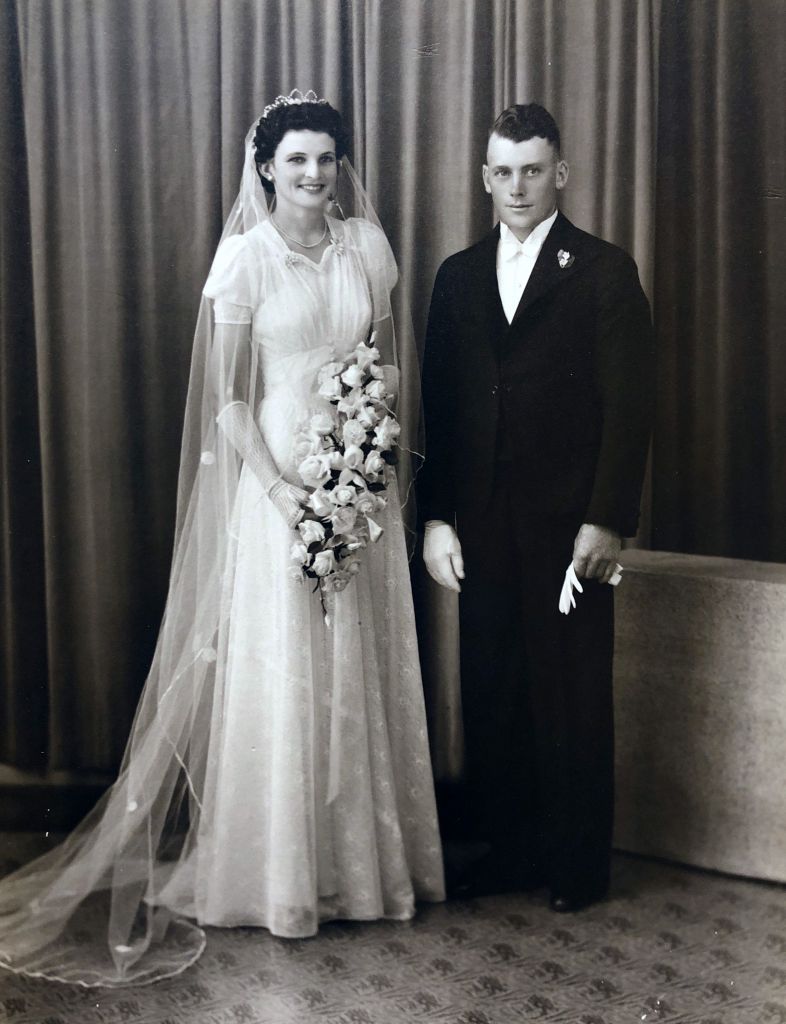
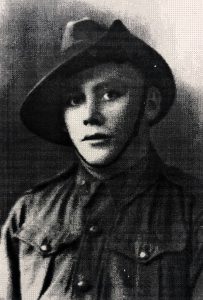
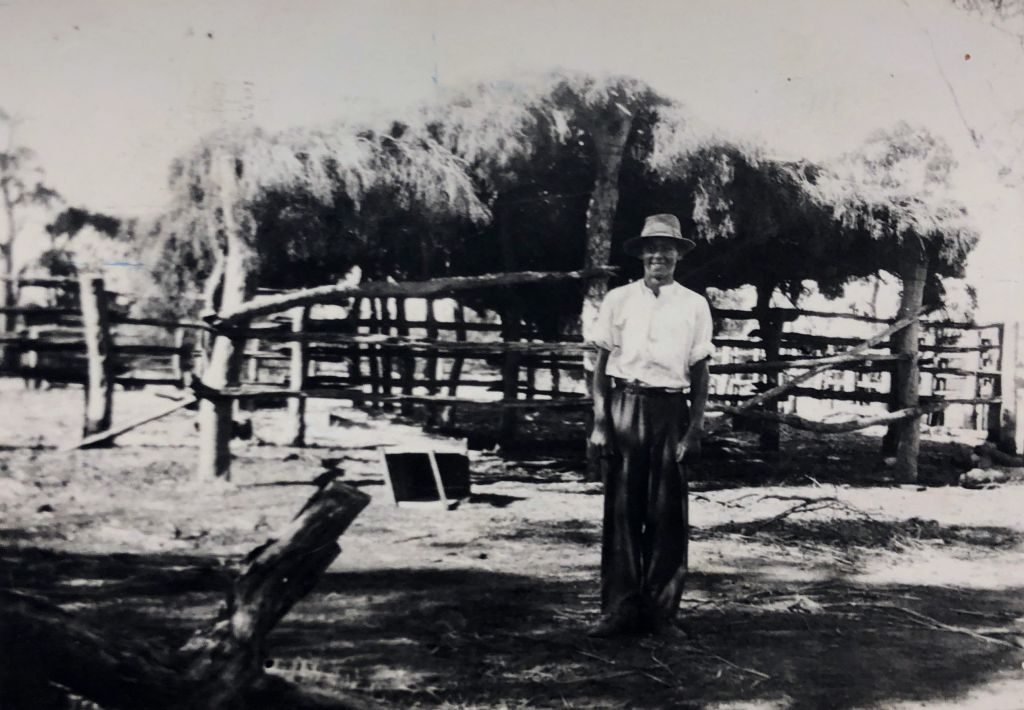
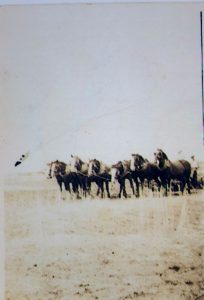
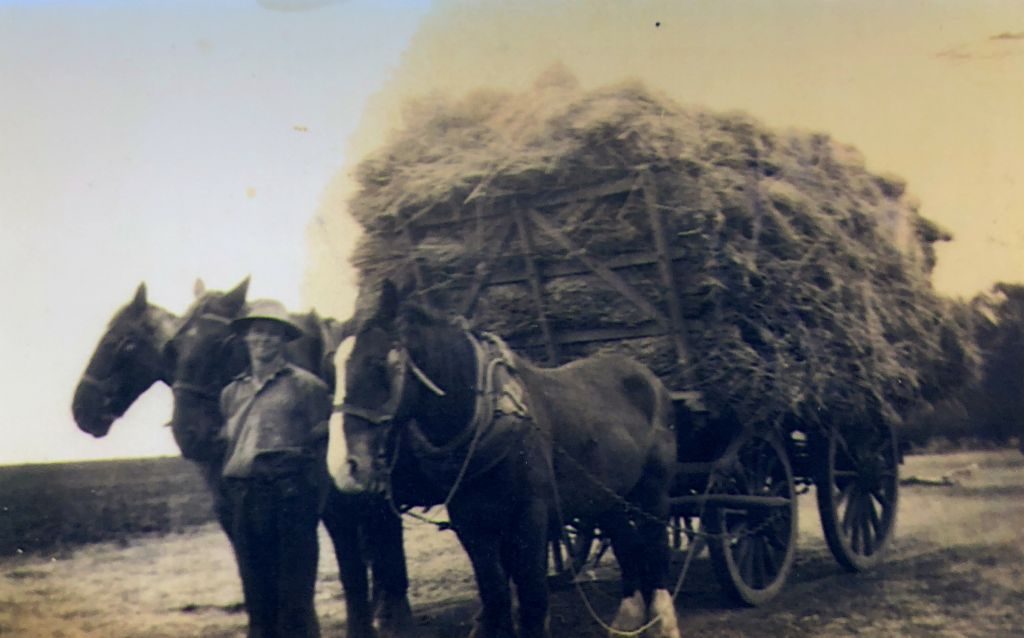
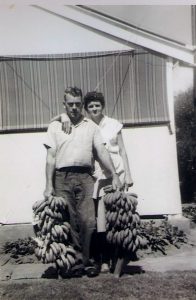

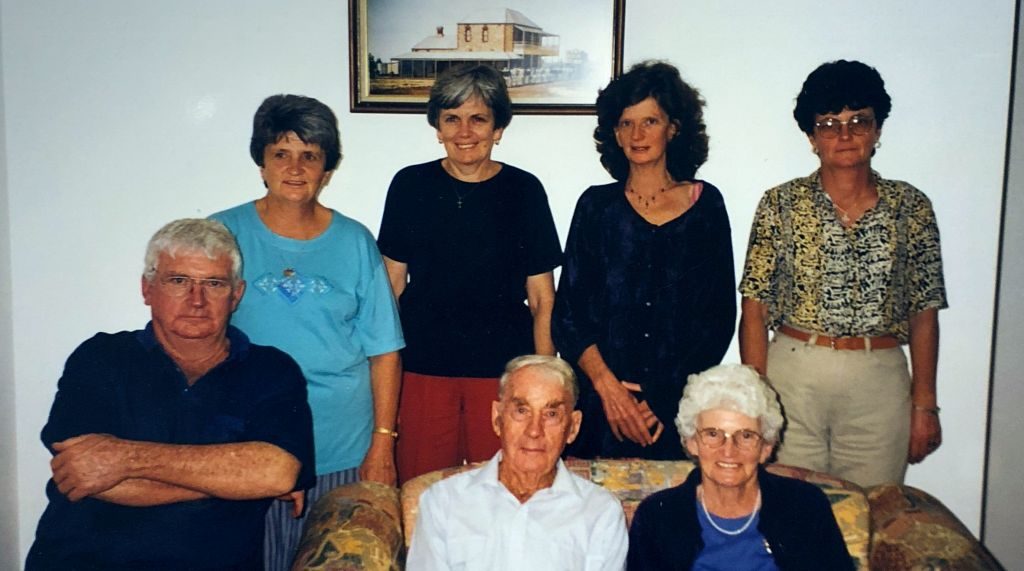

Comments
Thanks for taking the plunge Carmen and sharing with us this story
Its a wonderful tribute to a wonderful pioneering family
July 20th
Kevin Weir
Valuable history recorded in Bob’s story. The Desmonds were great neighbours and friends.
Dear Faye my name is Liz Fernandez my sister Alice Norton (nee Cunningham) was showing me your article on Bob Desmond and noted our maternal grandfather’s name was incorrect he was Michael Loughnan known as Mick. In the story it is quoted as McLouglin from Urawa. If you are able to amend the spelling to Loughnan we would appreciate it. It was a great story we enjoyed teading it. Regards Liz Fernandez nee Cunningham.
All done Liz
Thanks so much for the interest and the feedback.
Hi Liz, I am researching a woman named Karen Ingeborg Baar who had a company is Sydney in the 1950s. A Michael Collin Loughnan ‘Urawa Station, Box 48 via Mullawa, West Australia is listed as a shareholder. I’m assuming this was your grandfather but perhaps the wrong middle name. Would you know anything about this? It’s a really interesting story. You can find my email on the UNSW website or leave a reply here. Thanks, Mark Ian Jones
Lovely story enjoyed reading, so wonderful you have such a great memory of the past. My Grandfather Mick Loughnan was mentioned from Mullewa and I have fond memories and enjoy hearing more about the past days.
Thanks Louise,
Id love to hear more of what you have stored in your head
Im sure it would be most useful to expand some of these stories.
regards
Tony Critch
Hi Louise, I am researching a woman named Karen Ingeborg Baar who had a company is Sydney in the 1950s. A Michael Collin Loughnan ‘Urawa Station, Box 48 via Mullawa, West Australia is listed as a shareholder. I’m assuming this was your grandfather but perhaps the wrong middle name. Would you know anything about this? It’s a really interesting story. You can find my email on the UNSW website or leave a reply here. Thanks, Mark Ian Jones